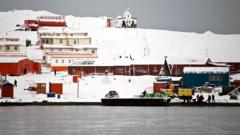Pope Leo XIV labels the return of the Chagos Islands as a considerable victory for refugees, while the UK-Mauritius deal raises tensions with opposition parties.
UK Agreement to Return Chagos Islands Marks Historic Progress, Says Pope

UK Agreement to Return Chagos Islands Marks Historic Progress, Says Pope
The Pope praises the UK's sovereignty transfer to Mauritius, calling it a significant milestone in a long-standing injustice.
The Pope recently expressed his joy over the UK’s decision to transfer sovereignty of the Chagos Islands back to Mauritius, deeming it a “significant victory” in the fight to address historical injustices faced by the Chagosian people. In a meeting with a group of Chagossian refugees at the Vatican, Pope Leo highlighted the agreement as a beacon of hope that would encourage the Mauritian government to facilitate the refugees' return home.
The treaty, finalized in May, allows Mauritius to reclaim the islands while guaranteeing continued operations of a U.S.-U.K. military base on Diego Garcia for a period of 99 years. Speaking in French, the Pope underlined the importance of respecting people's rights to their homeland, asserting that no one should be forced into exile by powerful nations.
First acquired by the UK for £3 million in 1968, the islands were later cleared of Chagossian residents to create space for military facilities, leading many inhabitants to seek refuge in Mauritius, Seychelles, or the UK. The recent agreement entails that the UK will compensate Mauritius approximately £101 million annually for the next 99 years.
Critics, including leaders of the UK opposition and some Chagossians living abroad, have condemned the agreement, claiming it threatens national security and reflects poorly on Britain’s foreign policy. Sir Keir Starmer, leader of the opposition, defended the deal, emphasizing that failure to reach an agreement could allow other nations, particularly China, to gain military footholds in the region.
The treaty stipulates a 24-mile exclusion zone surrounding Diego Garcia, preventing any construction without UK authorization, while barring foreign military and civilian access to other islands in the archipelago. Although the deal awaits parliamentary approval from both the UK and Mauritius, the Mauritian government has expressed jubilation at what it considers the conclusion of a 60-year struggle over the islands.
Moreover, two women born on Diego Garcia previously challenged the agreement in court, but the High Court dismissed their appeal, allowing the treaty to proceed. As negotiations and discussions unfold, the future of the Chagos Islands remains a focal point in international relations and advocacy for historical reconciliation.
The treaty, finalized in May, allows Mauritius to reclaim the islands while guaranteeing continued operations of a U.S.-U.K. military base on Diego Garcia for a period of 99 years. Speaking in French, the Pope underlined the importance of respecting people's rights to their homeland, asserting that no one should be forced into exile by powerful nations.
First acquired by the UK for £3 million in 1968, the islands were later cleared of Chagossian residents to create space for military facilities, leading many inhabitants to seek refuge in Mauritius, Seychelles, or the UK. The recent agreement entails that the UK will compensate Mauritius approximately £101 million annually for the next 99 years.
Critics, including leaders of the UK opposition and some Chagossians living abroad, have condemned the agreement, claiming it threatens national security and reflects poorly on Britain’s foreign policy. Sir Keir Starmer, leader of the opposition, defended the deal, emphasizing that failure to reach an agreement could allow other nations, particularly China, to gain military footholds in the region.
The treaty stipulates a 24-mile exclusion zone surrounding Diego Garcia, preventing any construction without UK authorization, while barring foreign military and civilian access to other islands in the archipelago. Although the deal awaits parliamentary approval from both the UK and Mauritius, the Mauritian government has expressed jubilation at what it considers the conclusion of a 60-year struggle over the islands.
Moreover, two women born on Diego Garcia previously challenged the agreement in court, but the High Court dismissed their appeal, allowing the treaty to proceed. As negotiations and discussions unfold, the future of the Chagos Islands remains a focal point in international relations and advocacy for historical reconciliation.





















